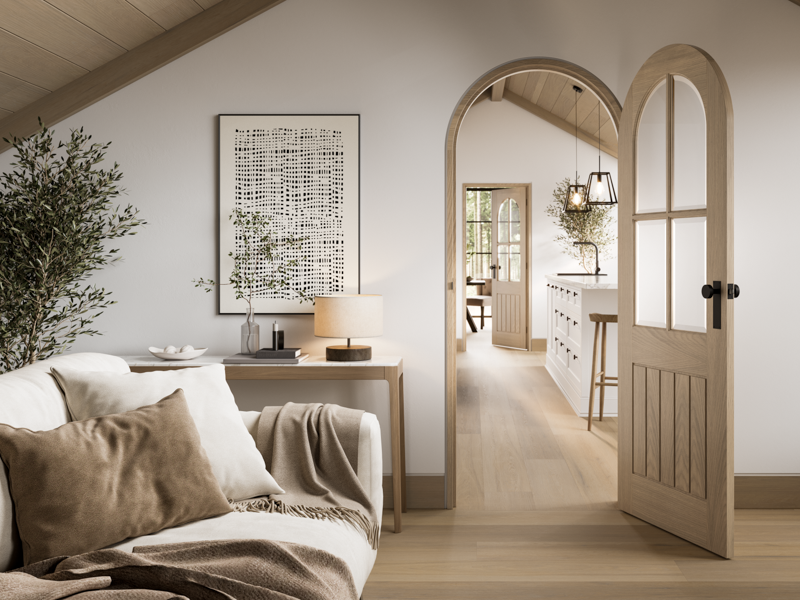
Buying the Right Size Door the First Time
Samuel MorrisBuying the Right Size Door the First Time: The Complete Guide
Buying a new internal door is an exciting upgrade — whether you're renovating a single room or giving your whole home a facelift. But one small misstep can cause big headaches: choosing the wrong size door. View our Best Sellers

Ordering the wrong size door means wasted time, extra expenses, and a lot of frustration. And sometimes, it’s not just the door that gets replaced — you might find yourself adjusting frames, walls, or floors to make things fit. Not ideal.
The good news? Getting it right the first time is totally doable — if you know what to look for.
In this guide, we’ll walk you through how to measure, what to consider, common mistakes, and pro tips so you can confidently buy the perfect size door the first time.
Why Buying the Right Size Door Matters So Much
At first glance, a door seems simple — just a panel that opens and closes. But there's a lot more going on:
1. Proper Fit Means Smooth Functionality
A correctly sized door will swing freely, close snugly, and latch securely. A door that's too big or too small can stick, drag, or even fail to close properly.

2. Looks and Style
A perfectly fitted door enhances the overall look of your space. An uneven gap at the top or bottom of a door can instantly make a room feel “off.”
3. Energy Efficiency
Gaps around a poorly fitted door can cause draughts, increasing heating and cooling costs.

4. Safety and Security
Especially with fire doors or external doors, a good fit ensures your home stays safe and compliant with regulations.
Understanding Door Sizing Basics
Before we get into measuring, it helps to understand the language of door sizing:
Door Slab Size vs Opening Size
- Door Slab: The physical door itself (no frame).
- Opening Size: The full space including frame or lining where the door will sit.
Important: Always clarify with your supplier whether measurements refer to the slab or the opening.

Standard UK Internal Door Sizes
Most internal doors fall into a set of standard sizes:
| Door Size (mm) | Door Size (Imperial) | Typical Use |
|---|---|---|
| 1981 x 762 mm | 6'6" x 2'6" | Standard bedroom doors |
| 1981 x 838 mm | 6'6" x 2'9" | Wider access (e.g., for wheelchairs) |
| 1981 x 686 mm | 6'6" x 2'3" | Smaller rooms |
| 2040 x 826 mm | Metric size, common in new builds |
Other variations (smaller and taller) are available, especially for wardrobes, cupboards, or special features.
Imperial vs Metric Confusion
Older UK homes (pre-1980s) often use imperial sizing, while newer homes use metric. Always double-check what system your home follows!
How to Measure Your Door Space Correctly
Accurate measurements are essential. Here’s a step-by-step guide:
Tools You'll Need
- Measuring tape
- Spirit level
- Pencil and notepad (or notes app)
- Step ladder (for taller doors)

Step 1: Measure the Width
- Measure the width of the door opening at three points: top, middle, and bottom.
- Record the smallest measurement — doors need to fit the tightest point.
Step 2: Measure the Height
- Measure from the floor (or threshold) to the underside of the frame or lintel at the left, middle, and right sides.
- Again, use the smallest measurement.
Step 3: Measure the Thickness
- Measure the thickness of the existing door or frame.
- Most internal doors are either:
- 35mm (standard)
- 44mm (fire doors)

Quick Example
Imagine you measure:
| Measurement Point | Width (mm) | Height (mm) |
|---|---|---|
| Top | 765 | 1995 |
| Middle | 762 | 1992 |
| Bottom | 760 | 1990 |
You’d order a door based on 760mm width and 1990mm height, and allow small fitting adjustments.
Step 4: Check Frame Squareness
- Use a spirit level to check that the frame is vertical and square.
- If the frame is warped, you might need a new frame or some adjustment.
Don't Forget These Hidden Factors
1. Flooring Changes
Are you installing new floors? If so:
- Carpet may require extra clearance underneath.
- Tiles, hardwood, or engineered wood may slightly raise floor height.
Always measure after the new floor is in or account for its thickness.
2. Architraves and Skirting Boards
If you're changing skirting boards or architraves, ensure they won't interfere with the door's swing or clearance.

3. Door Swing and Handing
Decide if you need:
- Left-hand door (hinges on the left when you push the door open toward you)
- Right-hand door (hinges on the right)
Some suppliers call it "left hung" or "right hung" — always double-check.

Choosing Between Door Slab Only or Door Set
What’s a Door Set?
A door set includes:
- Door slab
- Frame (lining or casing)
- Hinges
- Pre-machined latch and lock slots
Door sets are faster and easier to install, especially in new builds or full refurbishments.

When to Buy a Slab Only
- Frame is in good condition.
- You're matching existing hardware.
- You're replacing a door in an older or period home.
Bespoke Sizes: When Standard Won’t Cut It
Sometimes, your opening just doesn't match a standard size. In that case, you’ll need:
- Made-to-measure doors (usually more expensive and longer lead times)
- Trimming down a standard door (limited amount — usually 3–10mm each side)
Caution:
Trimming too much can void a door's warranty or compromise its fire rating.
Opt for Bespoke Steel - Easy Installation with OTIF

Special Cases to Know
Fire Doors
- Thicker (usually 44mm).
- Heavy — requires three hinges.
- Strict trimming limits.
- Must use certified frames and hardware.
Fire doors are life-saving equipment — always treat them seriously.
View The Windsor Oak Fire Door

Pair Doors (Double Doors)
- Measure the full width (including the gap between the doors).
- Allow space for rebates if using a rebated pair.

Pocket Doors (Sliding Into Wall)
- Measure the cavity kit opening.
- Ensure the structural opening allows full slide-in without obstruction.

Top 10 Mistakes People Make (and How to Avoid Them)
- Measuring the old door, not the opening.
- Assuming all doors are "standard."
- Not accounting for new floor levels.
- Ordering without checking door handing.
- Ignoring trimming limits.
- Forgetting about frame squareness.
- Choosing a fire door and over-trimming it (dangerous!).
- Not checking delivery sizes (especially upstairs).
- Assuming DIY fitting will be easy without experience.
- Leaving too little time for a bespoke order.
Quick Pre-Order Checklist ✅
- Correct width, height, thickness measured?
- Accounted for final floor level?
- Confirmed door handing?
- Decided slab only vs door set?
- Checked fire regulations if needed?
- Trim allowances understood?
- Delivery logistics considered?
Conclusion: Take Your Time, Measure Twice, Buy Once
Buying a new door should be an exciting upgrade — not a logistical nightmare.
By measuring carefully, understanding how door sizes work, and considering all the hidden details (like flooring and handing), you’ll avoid costly mistakes and delays.

Take your time. Measure twice. Ask questions.
And if you’re ever unsure, get advice from a trusted door specialist — at Interior Doors Ltd, we’re here to help you every step of the way.
Whether you’re refreshing a single room or fitting out a whole house, getting the right size door the first time will save you money, stress, and future regrets.
